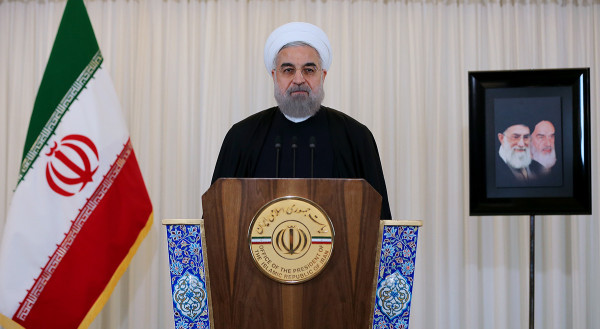President Rouhani has told Iranians that years of sanctions over Tehran’s nuclear program — including US and European restrictions that have crippled Iran’s economy since 2010 — will end within five weeks.
Rouhani celebrated the official closure of the file on Iran’s past nuclear activities with a nationally-televised speech:
To the great Iranian nation, I announce that sanctions will be lifted in the month of Dey [December 21-January 20].
We invite all domestic and foreign entrepreneurs, as well as Iranians residing abroad, to make the best use of the investment opportunities with the people who seek constructive interaction with the world.
On Tuesday, the Board of Governors of the International Atomic Energy Agency approved a report that concluded that Iran has not pursued any steps towards a militarized nuclear program since 2009.
The IAEA will now review Iran’s compliance with the terms of the July 14 nuclear deal with the 5+1 Powers (US, Britain, China, France, Germany, and Russia). If the Agency verifies adherence, the US and European Union will then begin the lifting of sanctions.
See Iran Daily, Dec 16: IAEA Officially Closes Enquiry Into Past Nuclear Activity
Rouhani celebrated on Wednesday:
The victory of the Iranian nation in the wake of the closure of the PMD [possible military dimensions] file was a success and a great moral, political, and legal victory. This success shows that this [political] system speaks with honesty to its people and the world and is faithful to its promise; if it accepted and signed treaties and conventions, it will adhere to them.
Although the Government has reduced inflation from about 45% to less than 15% since August 2013, it faces years of declining production and investment — especially from foreign firms — and a weak currency. The problem has been compounded by a 40% decline in Iran’s oil exports since 2012, combined with a 60% fall in the global price over the past 16 months.
Facing a massive deficit for 2016/17, President Rouhani has yet to submit a budget and the 2016-2020 National Development Plan to Parliament for consideration.
Rouhani may also be confronted with political challenges over economic development. Much of Iran’s infrastructure and many of its projects are tied to concerns linked to bodies like the Revolutionary Guards, who will see foreign investment and operations as a challenge.
The President implicitly acknowledged the issue, as well as hardline criticism of the nuclear deal:
We must be prepared to stimulate the economy…The private sector and entrepreneurs should engage in this new space….
Today is the day that we must—more than any other time—think in [terms] of integrity and unity. The time of criticism, which was valuable in its own right, no longer has a place, and all of us must strive for implementing the JCPOA [Joint Comprehensive Plan of Action]…for the growth and development of our country.
Perhaps most importantly, Rouhani’s timeframe is likely to be far too optimistic. The complexity of the sanctions regime — especially that imposed by the US — means that it will takes month of both political and corporate decisions to renew the investment, notably in the energy sector, that is necessary for Iran’s recovery.

